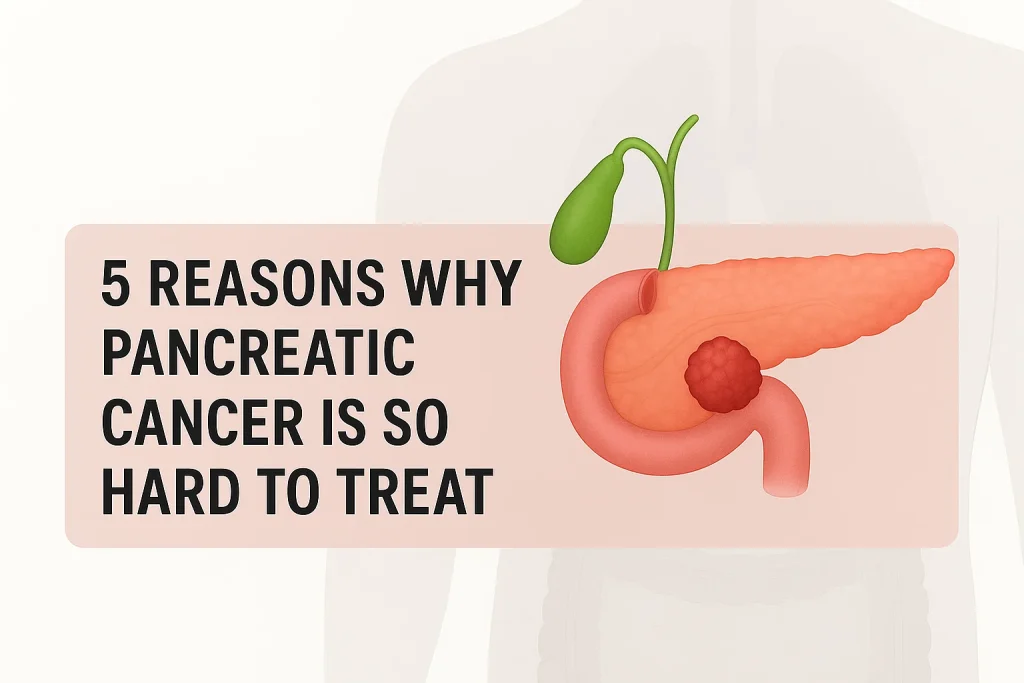
Why pancreatic cancer is so hard to treat?
Why Pancreatic Cancer Is So Hard to Treat: Causes, Symptoms & Breakthroughs
Pancreatic cancer is still one of the most challenging cancers to treat, even with the introduction of precision medicine, targeted therapies, and immunotherapy. Despite tremendous advancements in cancer treatment, pancreatic cancer remains a significant challenge for physicians and researchers. Due to its aggressive nature, late detection, and resistance to traditional therapies,
This article will guide you to know the 5 key reasons why pancreatic cancer is so hard to treat, along with the latest advancements in diagnosis and treatment.
1. Late Diagnosis
Over half of pancreatic cancers are discovered at stage 4, usually after the disease has already spread to other vital organs like the liver. This is mainly due to early-stage pancreatic cancer typically shows no symptoms or only mild ones like weight loss, fatigue, or mild digestive problems.
Common Early Warning Signs:
- Dark-colored urine
- Nausea or vomiting
- Weight loss
- Jaundice (yellowing of skin or eyes)
- Abdominal or back pain
- Extreme fatigue
- Bloating and swelling
Only 44% of patients with localized pancreatic cancer survive beyond five years, making early detection vital.
2. Tumors Are Often Inoperable
Due to its aggressive nature, it invades nearby blood vessels and tissues, making surgical removal extremely difficult or even impossible in some cases.
The Whipple Procedure: It is a complex surgical procedure done to improve the survival chances of affected patients. It involves removing parts of the pancreas, stomach, bile duct, gallbladder, and lymph nodes. Even after a successful Whipple, it remains a high-risk operation. The five-year survival rate is relatively low, around 25%.
3. Tumors Form a Dense Barrier
Pancreatic tumors can hide themselves by developing a protective barrier of fibrous tissue (desmoplasia). This barrier acts like a shield, affecting cancer treatment by preventing chemotherapy drugs and immune cells from effectively reaching the tumor. It can make immunotherapy less effective due to the dense tumor microenvironment that suppresses immune responses.
4. Genetic Mutations with No Targeted Therapies
There are no current targeted treatments for mutations in genes such as KRAS and TP53, which can lead to pancreatic cancer. While some KRAS mutations can now be targeted in other cancers (e.g., KRAS G12C in lung cancer), the lack of effective biomarkers means that personalized treatments required for pancreatic cancer care are still under development.
5. Ineffective Immunotherapy
Pancreatic cancer has poor immunogenicity, meaning it doesn’t trigger a strong immune response, unlike other cancers, such as melanoma or lung cancer. Immunotherapy, like Checkpoint inhibitors, is often ineffective unless the tumor shows a high mutational burden or other rare biomarkers that limit the use of immunotherapy in most pancreatic cancer cases.
Pancreatic Cancer Statistics: A Detailed Overview
| Statistic | Data/Insight | Explanation |
| 5-Year Survival Rate (Metastatic) | 3.20% | Only 3.2% of patients diagnosed with metastatic (stage 4) pancreatic cancer survive for five years or more. This highlights the aggressive and late-detected nature of the disease. |
| Overall 5-Year Survival Rate | Approximately 13% | While slightly improved over the years, the overall 5-year survival rate remains low compared to other cancers. |
| Leading Cause of Cancer Death | 3rd in rank | Pancreatic cancer is the third leading cause of cancer-related deaths, following lung and colorectal cancers. |
| New Cases vs. Deaths (U.S.) | ~64,000 new cases/year; ~50,000 deaths/year | The high fatality rate closely follows the number of new diagnoses, indicating limited success in treatment outcomes. |
| Change in Survival Rate Over 30 Years | Minimal progress | Despite medical advances, there has been little improvement in long-term survival rates due to late diagnosis and treatment resistance. |
| Stage at Diagnosis | 50% diagnosed at Stage 4 | Over half of pancreatic cancer cases are diagnosed at an advanced stage, severely limiting treatment options and prognosis. |
| Common Age of Diagnosis | Average: 70 years | Most patients are diagnosed in their 70s, often with comorbidities that complicate treatment. |
Pancreatic Cancer Statistics: India
| Statistic | Estimated data |
| Annual New Cases (India) | ~13,661 (2022) |
| Incidence Rate (Age-Standardized, per 100k) | 0.96 (both sexes, 2022) |
| Mortality Rate (Annual Deaths) | ~12,759 (2022) |
| Mortality Rate (Age-Standardized, per 100k) | 0.90 (both sexes, 2022) |
| 1-Year Overall Survival (All Stages) | Not consistently and widely reported for India. |
| 5-Year Overall Survival (All Stages) | ~7–9% (consistent with older Indian data); Globally ~12-20% |
| 5-Year Survival—Localized Disease (after surgery) | ~20-22% (for resectable cases) |
| Survival | Survival— |
| The stage at Diagnosis (India) | The majority (~55-70%) are present at advanced/unresectable or metastatic stages. |
| Geographical Variation (Incidence) | The highest incidence is in Northeastern Indian regions (e.g., Mizoram); the Lowest in some southern regions (e.g., Dindigul, Tripura). |
| Geographical Variation (5-yr survival) | Specific recent data is not widely available across all states. |
NOTE: The data given in the above tables may be subject to change with the latest research and studies.
What’s New in Pancreatic Cancer Research?
Despite the challenges, breakthroughs are offering hope to patients and families.
1. Liquid Biopsies
A blood test that checks and identifies RNA fragments from tumor cells circulating in the bloodstream may help in the earlier detection of pancreatic cancer.
2. Pancreatic Cancer Vaccines
Experimental vaccines are being tested to stimulate immune cells and lower the chance of recurrence following surgery. Patients who respond to certain RNA-based vaccine trials have a longer survival rate.
3. Exosome-Based Diagnostics
Researchers are examining exosomes, which are microscopic messengers secreted by cells, to learn more about how pancreatic tumors proliferate, compromise immunity, and evade therapy. They might develop into diagnostic or therapeutic instruments in the future.
A key thought:
Pancreatic cancer continues to rank among the most challenging cancers to treat because of its slow onset, intricate surgical requirements, resistance to traditional treatments, and distinct genetic makeup. However, advanced emerging techniques like precision diagnostics, cancer vaccines, and liquid biopsies are giving rise to hope. If you or a loved one has been diagnosed, it’s essential to get a second opinion and look into clinical trial options that could give you access to revolutionary, potentially life-extending treatments.
Frequently Asked Questions (FAQs)
What are the first symptoms of pancreatic cancer?
Common symptoms include Dark urine, weight loss, abdominal pain, fatigue, and jaundice, which are common warning signs.
Is Stage 4 cancer curable?
The cure is rare and typically only possible if the cancer is detected early and completely removed surgically. Advanced pancreatic cancer is generally metastatic with a very low cure rate.
Is surgery an option in Stage 4 pancreatic cancer?
At this point, surgery is usually not an option because of widespread metastases. Symptom relief and systemic treatments are typically the main preferences.
How fast does pancreatic cancer spread?
Pancreatic cancer frequently reaches advanced stages before diagnosis and is known to spread quickly and silently.
Is the Whipple surgery risky?
Yes, it’s complicated, but if done by skilled surgeons, it can increase survival.
Can immunotherapy help in Stage 4 pancreatic cancer?
Although immunotherapy is typically less successful for this cancer type, it might be beneficial for patients whose tumors have BRCA mutations, TMB mutations, or MSI mutations, or as part of a clinical trial.







